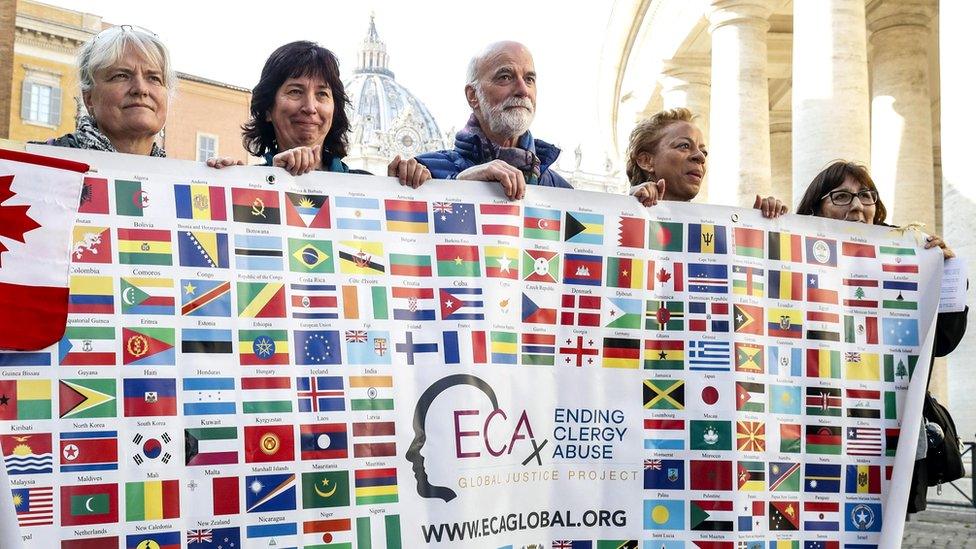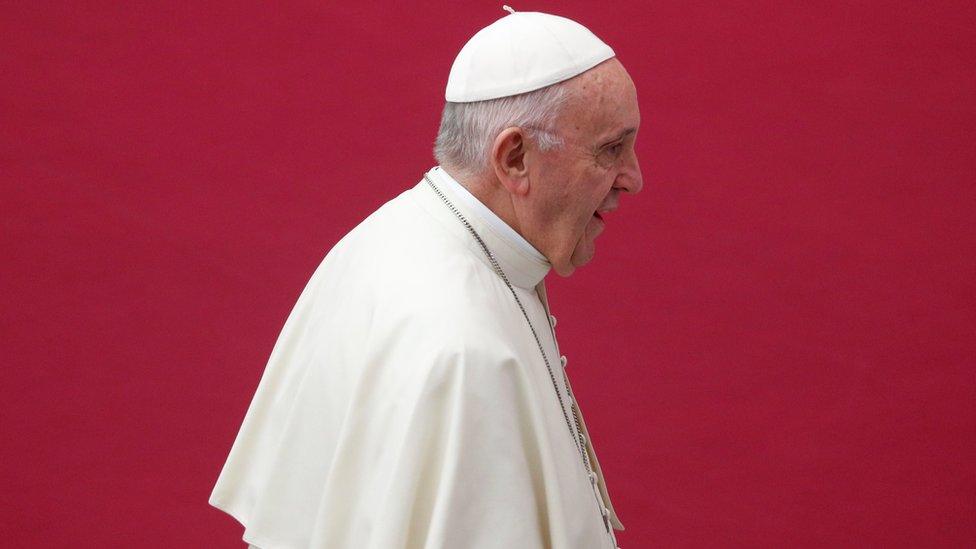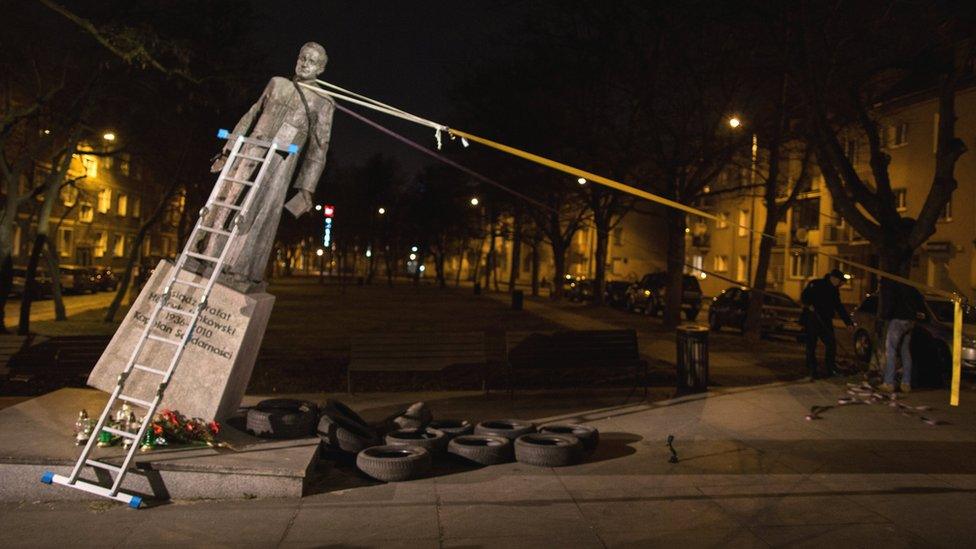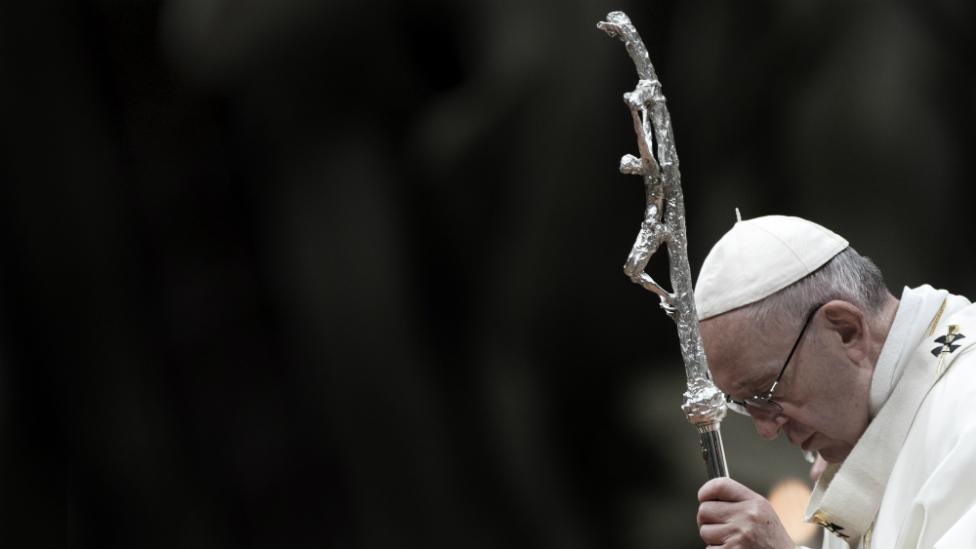Pope Francis: Concrete action needed against child abuse at Church
- Published
Brigitte, a survivor of child sex abuse by a chaplain, explains why she is ready to speak now (From 2019)
Pope Francis has said the world expects "concrete measures" to tackle child sexual abuse by priests and not only "simple and obvious condemnations".
At a summit to discuss the scandals that have rocked the Roman Catholic Church, he said "the cry of the little ones seeking justice" had to be heard.
Details of sexual abuse have emerged across the world and the Church has been accused of covering up crimes.
Survivors say new safeguarding protocols are needed to protect minors.
When he was elected in 2013, Pope Francis called for "decisive action" on the issue, but critics say he has not done enough to hold to account bishops who allegedly covered up abuse.
Thousands of people are thought to have been abused by priests over many decades.
What have abuse survivors said?
In video testimonies watched by summit participants, one survivor from Africa said she was forced to have sex with a priest from the age of 15. "This lasted for 13 years. I got pregnant three times and he made me have an abortion three times."
Another victim, from the US, said he still felt pain after the "total loss of the innocence of my youth" and urged bishops to show "leadership, vision and courage".
"I still carry pain. My parents still carry pain at the dysfunction, the betrayal, the manipulation that this bad man, who was our Catholic priest at the time, wrought upon my family and myself."

Representatives of the organisation Ending Clergy Abuse (ECA) demonstrate in Rome
Speaking to the BBC, Brigitte, who had been abused by a chaplain, said she was initially "afraid" to tell people about her story because she was told she would "never become an angel in heaven".
"He said 'come and sit with me on the chair and we will read together'. Then there was a kiss, then there was another physical thing - it came more and more."
Earlier, Marie Collins, a survivor of abuse as a child in Ireland in the 1960s, told the BBC that "many men" in the Church still see the issue as "a sin that can be forgiven".
"They don't grasp, or they don't want to grasp, the devastating effect it has and the fact that it's a crime," she said. "That can no longer go on... this is a make or break time for the Church."
What has the Pope said?
In a short opening statement for the four-day summit at the Vatican, the 82-year-old pontiff said he wanted to "reach out" to victims after being made aware of "the scourge of sexual abuse committed by men of the Church against minors".
"The holy people of God look at us and await from us not simple and obvious condemnations, but concrete and effective measures to put into place. Concreteness is required.
"I ask the Holy Spirit to support us in these days and to help us to transform this evil into an opportunity for awareness and purification.
"May the Virgin Mary enlighten us to try to cure the serious wounds that the scandal of paedophilia has caused both in children and in believers."

The Pope is under pressure to tackle the issue with concrete measures
The unprecedented conference - called Protection of Minors in the Church - is being attended by the heads of all national bishops' conferences from more than 130 countries.
The Vatican has tried to reduce expectations, saying the event will be used to "identify proposals" and that any agreed action will be taken at a later date.
Pope Francis is under serious pressure to provide leadership and generate workable solutions to what is the most pressing crisis facing the modern Church.

The Pope's biggest challenge
By Martin Bashir, BBC religion editor
Pope Francis must confront the assumptions, attitudes and practices that have allowed a culture of abuse to flourish. The extent of this challenge may prove overwhelming.
This is only the beginning of an attempt to address a sickness that has been poisoning the Church since at least the 1980s, leaving its moral authority in tatters.
The focus is now firmly fixed on Pope Francis, who leads an organisation with more than 1.2 billion adherents, present in virtually every country on Earth.
His pontificate began with widespread enthusiasm for a man who chose pastoral appeal over pomp and ceremony, humility and compassion over the trappings of status. But how it ends is likely to depend on the action he takes, and the protocols he implements, to deal with the scourge of abuse.

How is the Church addressing the abuse?
Archbishop of Manila Cardinal Luis Antonio Tagle told the summit clerical abuse took place because of a misuse of power.
But many, including conservative critics of Pope Francis, challenge this view and believe homosexuality is the real root cause of the abuse.
As the event started, one of its four organisers - Archbishop of Mumbai Oswald Gracias, one of the Church's most senior cardinals - admitted that he could have better handled allegations that were brought to him.
Some groups of survivors have voiced scepticism that any concrete action will be taken during the event, calling it a publicity stunt aimed at cleansing the image of the Church.
Meanwhile, observers argue that implementing universal protocols is challenging because the Church exists in a range of cultures and judicial systems.
Although progress has been made in some countries, in other places it is still not considered to be a priority. Some churches in Asia and Africa, in particular, even deny the problem exists.

A statue of Henryk Jankowski, who died in 2010, is overturned in Poland
In Poland on Thursday, a statue of the late priest Henryk Jankowski, who has been accused of sexually abusing minors, was pulled down from its plinth by protesters in the city of Gdansk.
Earlier this month, an 88-year-old former cardinal was defrocked in the US over claims of abuse, the most senior Catholic figure to be dismissed from the priesthood in modern times.
Pope Francis has also admitted that clerics have sexually abused nuns, and in one case they were even kept as sex slaves.
- Published20 February 2019
